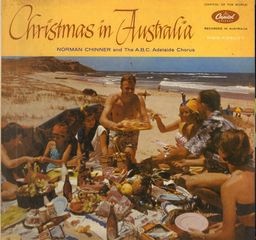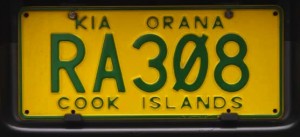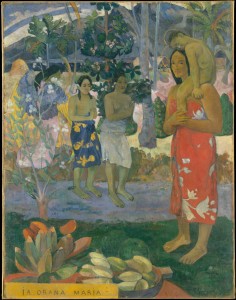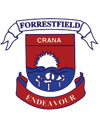
Many of us who remember the 1960s in Australia know the chorus ‘Orana! Orana! Orana to Christmas Day’ (listen via iTunes, track 13) in one of the popular Australianised seasonal songs of the period. The lyricist, ABC staff writer John Wheeler (fl. 1940–70, with composer William Garnet ‘Billy’ James 1892–1977), likely found the word Orana in one of the notorious naming booklets: Orana ‘welcome’ has been listed in many of them as an Aboriginal word of NSW, beginning with (1921:5) (and see table below). Update: ‘Carol of the birds’ was in the first set of Five Australian Christmas carols, released for Christmas 1948 (Catholic Weekly 23 Dec 1948, page 2, Magazine Section), which implies Wheeler’s source was one of the Thorpe or Tyrrell booklets published before WWII.
In the 1970s Orana got another boost in New South Wales, from official naming:
ORANA, an Aboriginal word meaning “welcome” and, since 1972, the name of a region in New South Wales. The Orana Region (formerly North–Western Region) covers roughly the central third of the State’s northern half. ( 1988:2169)
Thereupon a number of business names in the region incorporated Orana (as witness these Yellow Pages listings), and its ‘capital’, Dubbo, has the Orana Mall: ‘the premier shopping centre in the Central West … servicing the Region since 1979’ (from the Mall’s website).
The next development was that Wiradjuri, the language of the country around Dubbo, was somehow taken to be the source of the word:
The Orana, meaning ‘Welcome’ in Wiradjuri, is the largest and most diverse region in the State, http://www.rdaorana.org.au/Orana.htm
However, I have not been able to find any Australian record of Orana other than in those 1920s booklets. Furthermore, salutations are not usual in Australian languages (that is, the languages usually don’t have a word that is primarily a salutation); in particular and the 19th century Wiradjuri wordlists don’t have a match for Orana, and Wiradjuri words typically don’t begin with a vowel. These days Wiradjuri people use gawaymbanha ‘welcome, tell to come’, as listed in the Wiradjuri Dictionary app released in June.
Also during the 20th century Orana has been applied to name dozens of homesteads and other features of the built environment, as shown here: Without having looked into the origin of each of these, I expect that the namers have drawn on the booklets of the 1920s-70s.

So where did Thorpe and the other compilers get Orana from, if not from an Australian language? Well, the word is commonplace in the Cook Islands, even to the Rarotongan greeting Kia orāna1 being on their vehicle registration plates. Rarotongan orāna shares its stem with the Māori greeting Kia ora! But while Kia ora is somewhat known in Australia as a greeting, orāna is not, and orāna is not in Māori, and the Cook Islands are further away than New Zealand.
Even more distant is Tahitian Ia Orana ‘Hello’. So how might the Tahitian expression have come to the attention of W.W. Thorpe when he was compiling his 1921 booklet in Sydney? Here’s a possibility: the most famous use of Orana outside of Polynesia would have to be in

Ia Orana Maria ‘Hail Mary, Ave Maria’, the title of Gaugin’s 1891 painting which has its title prominently within it. Contributing to the painting’s fame was that ‘It was very radical for Western painting to have a brown Madonna and Child; as a matter of fact papal allowance for this was not given until 1951’ according to one commentator.
Crana
The same booklet that introduced Orana has just one other ‘welcome’ word, Crana (1921, 2). Crana occurs only in Thorpe and Tyrrell’s booklets, in the 1920s and 1930s, and each also lists Orana, whereas Orana occurs in a number of other booklets, to 1980, without Crana (see the table below). And just as for Orana, I have not been able to find any Australian record of Crana prior to the 1920s booklets. Hence I take Crana to have originated with a misreading of the initial letter of Orana.
The Crana entry appears to have been drawn in at least one instance. Forrestfield Primary School opened in Perth in 1927, and Crana was added to the school crest:
In 1969/70 a competition was held for the design of a school crest. The present crest was the winning entry … The word ‘CRANA’ is Gaelic and was carried over from the original school and means ‘WELCOME’. http://www.ffps.wa.edu.au/page/56/School-History
Yes, Crana is a Gaelic word in that it is the name of a river in Ireland, which has given its name to a town, and for instance Crana College (founded 1925), on Crana Road, Buncrana, County Donegal. However there isn’t a word like crana ‘welcome’ in Gaelic.
Publication history
The table shows the publication history of the two words in the naming booklets (and some newspaper reprints of excerptions). Notice that Crana was dropped from booklets after the 1930s, whereas Orana was retained through their period.
|
decade
|
Orana
‘Welcome’ |
absent
|
Crana
‘Welcome’ |
|
1910s
|
1914
|
||
|
1920s
|
1921:5
1927:12 |
1923
|
1921:2
1927:6
|
|
1930s
|
1933:35
1938:12 |
1930
1937
|
1933:17
1938:6
|
|
1940s
|
1949:19
|
1944
|
|
|
1950s
|
Cooper 1952:21 McCarthy 1952:15 Sugden [1954] Endacott 1955:45 Onus 1956:4 Cooper 1957:20 McCarthy 1959:15 |
1951
1955
|
|
|
1960s
|
1961:29
1962:27 ‘to welcome’ 1963:15
1966:35
1969:4 |
1968
1969
|
1961:29
1966:35
1969:4
|
|
1970s
|
1970:71
1971:15 1973:45 1977:213 1979:27 ‘to welcome’
|
||
|
1980s
|
1980
|
1982
|
Table: Lineage of Orana ‘Welcome’, also Crana
Conclusion
In modern Australian usage Orana has gone feral (even more than Akuna, 2014), and has been anonymised from its linguistic and geographic origins. It is unclear how it arrived from Polynesia.
Acknowledgements
I am grateful to (2014) and Jeremy Steele for use of their lexical databases, and Geoscience Australia’s gazetteer.
References
Anonymous. 1937. Aboriginal house names. Chronicle (Adelaide) 55. http://nla.gov.au/nla.news-article92486622.
Anonymous. 1961. Aboriginal house names and their meanings. Australian Women’s Weekly 2,28–29. http://nla.gov.au/nla.news-page4830882.
Anonymous. 1966. Aboriginal house names and their meanings. Australian Women’s Weekly 32–33,35. http://nla.gov.au/nla.news-page4939793.
Anonymous. 1969. Pick a NAME that fits. Home Beautiful mini-guide 13.
Anonymous. 1980. Musical Aboriginal words : address book. [Melbourne]: Dynamo House. http://trove.nla.gov.au/version/34803420.
Anonymous. 1988. The Australian encyclopaedia. Terrey Hills, N.S.W.: Australian Geographic for the Australian Geographic Society, 5th edition.
Bowern, Claire. 2014. Data “big” and “small” — Examples from the Australian lexical database. Linguistics Vanguard http://www.degruyter.com/view/j/lingvan.ahead-of-print/lingvan-2014-1009/lingvan-2014-1009.xml?format=INT.
Cooper, H.M. 1949. Australian Aboriginal words and their meanings. Adelaide: South Australian Museum. http://handle.slv.vic.gov.au/10381/181988.
Cooper, H.M. 1952. Australian Aboriginal words and their meanings. [Adelaide]: South Australian Museum, 2nd ed. rev. and enlarged. edition. http://trove.nla.gov.au/version/22390169.
Cooper, H.M. 1957. Australian Aboriginal words and their meanings. Adelaide: South Australian Museum, 3rd edition.
Cooper, H.M. 1962. Australian Aboriginal words and their meanings. Adelaide: South Australian Museum, 4th edition. http://trove.nla.gov.au/version/24073699.
Cooper, H.M. 1979. Australian Aboriginal words and their meanings. Adelaide: South Australian Museum, 4th edition, reprinted.
Endacott, Sydney J. 1923. Australian Aboriginal native names and their meanings. Melbourne: Sydney J. Endacott, 1st edition. http://nla.gov.au/nla.aus-vn938496.
Endacott, Sydney J. 1944. Australian Aboriginal native words and their meanings. Melbourne: Robertson & Mullens, 4th ed edition. http://handle.slv.vic.gov.au/10381/133262.
Endacott, Sydney J. 1955. Australian Aboriginal words and place names and their meanings. Melbourne: Georgian House, 9th enlarged edition. Reprinted with additions 1963.
Endacott, Sydney John. 1973. Australian Aboriginal words and placenames and their meanings. Melbourne: Acacia Press, 10th edition.
Ingamells, Rex. 1955. Australian Aboriginal words: Aboriginal–English;English–Aboriginal. Melbourne: Hallcraft Publishing Company.
Kenyon, Justine. 1930. The Aboriginal word book. Melbourne: Lothian Publishing Company.
Kenyon, Justine. 1951. The Aboriginal word book. Melbourne: Lothian Publishing Company, 2nd ed. completely revised.
Kenyon, Justine. 1982. The Aboriginal word book. Melbourne, Sydney: Lothian Publishing Company.
Massola, Aldo. 1968. Aboriginal place names of south-east Australia and their meanings. [Melbourne]: Lansdowne.
McCarthy, Frederick D. 1952. New South Wales Aboriginal place names and euphonious words, with their meanings. Sydney: A. H. Pettifer, Govt. Printer. URL http://nla.gov.au/nla.obj-5736012.
McCarthy, Frederick D. 1959. New South Wales Aboriginal place names and euphonious words, with their meanings. Sydney: The Australian Museum, 3rd edition.
McCarthy, Frederick D. 1963. New South Wales Aboriginal place names and euphonious words, with their meanings. Sydney: The Australian Museum, 4th edition.
McCarthy, Frederick D. 1971. New South Wales Aboriginal place names and euphonious words, with their meanings. Sydney, N.S.W.: Australia Museum, 5th edition.
McCarthy, Frederick D., and W.W. Thorpe. 1943. New South Wales Aboriginal place names and euphonious words, with their meanings. Sydney: A.H. Pettifer, Acting Govt. Printer, [4th ed.] edition. Based on the original compilation of W.W Thorpe, first published in 1921.
Nash, David. 2014. What flows from ngaka-rna — how naming books spread a Dieri word. Placenames Australia: Newsletter of the Australian National Placenames Survey 1,7–9. http://www.anps.org.au/documents/Dec_2014.pdf. * longer blog post version
Onus, Mary. 1956. Aboriginal house names. The Australian Home Beautiful 53.
Reed, A.W. 1969. Aboriginal words of Australia. Terrey Hills, N.S.W.: Reed, paperback. ed edition. First published in clothbound edition 1965.
Reed, A.W. 1970. Aboriginal place names and their meanings. Sydney: AH & AW Reed.
Reed, A.W. 1977. Aboriginal words and place names. Adelaide: Rigby. Originally published as two separate works: Aboriginal words of Australia, Sydney: Reed, 1965 and Aboriginal place names and their meanings, Sydney: Reed, 1967.
Sugden, Joah H. [1954]. Aboriginal words and their meanings. Sydney: Dymock’s.
Thorpe, W.W. 1921. List of New South Wales Aboriginal words and their meanings: with some well-known place names. Sydney: Australian Museum, 1st edition.
Thorpe, W.W. 1927. List of New South Wales Aboriginal place names and their meanings. Sydney: Australian Museum, 2nd edition. URL http://nla.gov.au/nla.aus-vn1890695.
Thorpe, W.W. 1938. List of New South Wales Aboriginal place names and their meanings. Sydney: Australian Museum, 3rd edition (4th reprint). URL http://nla.gov.au/nla.aus-vn3721657.
Tyrrell, James R. 1933. Australian Aboriginal place-names and their meanings. Sydney: Simmons Limited. URL http://trove.nla.gov.au/work/11296687, http://catalog.hathitrust.org/Record/001873124.
Watkin, E.I. 1914. Australian native words and their meanings. Melbourne: Sydney J. Endacott.
Notes
- Literally ‘Be well’, from ora (v.i.) ‘Live, survive, (be) alive, living’ http://cookislandsdictionary.com. From Proto Polynesian OLA.1 ‘Be alive, well, healthy (not dead, ill)’ http://pollex.org.nz/entry/ola.1/.
 Follow
Follow
When the word “Torana was first used for a car, I thought they missed a great opportunity: “Torana! Torana! Torana for Christmas day”.
Thank you Chris… I think!: you’ve now made me wonder where Holden got the name from. An unsourced Wikifact is that ‘The name comes from an Aboriginal word meaning “to fly”‘. (The model first appeared in 1967.)
Another friend has rightly commented that ‘Orana’ in that chorus has a resonance with ‘Hosanna’.
Another nice analysis David. I enjoyed this.
A couple of additional thoughts (for what they are worth). Cook Island Māori and NZ Māori are closely related, as is Tahitian and Māori (as evidenced by the Tahitian Tupa’ia who accompanied Cook on his first voyage. Tupa’ia was able to communicate with the NZ Māori very well). Of course Cook Island Māori is the parent of NZ Māori.
I’ll alert Paul Geraghty to your piece. No doubt he will have more to add.
A few added references below. Savage’s notes on kia ora hint at CI Māori being the forerunner of NZ Māori.
1. Williams, H.W. (1985). A Dictionary of the Māori Language. Wellington: P.D. Hasselberg, Government Printer.
ora 1. a. Alive
2. well in health
3. safe
4. satiated, satisfied with food
5. survive, escape
6. recover
7. n. slave
oranga 1. n. food, livelihood
2. welfare, satisfaction
3. remnant, survivor
kia ad. or conj. 1. to introduce a proposition
2. to denote a wish, purpose or effect
etc.
2. Ryan, P.M. (1989). The Revised Dictionary of Modern Māori. Auckland: Heinemann Education.
kia let (express a wish); when; so that
kia ora hello!; thanks!; may you have health
ora alive; well; full [satiated from eating]
oranga health; welfare
3. Savage, Steven (1980). A Dictionary of the Māori Language of Rarotonga. Suva: Institute of Pacific Studies
kia adv. or conj. Used to introduce a proposition, or denote a wish, purpose or effect: so that; in order that, until: used to mark the relation between the subject and some future time, and in instituting a comparison
ora n. life, state of living […] v.t & v.i. to live, to escape from any danger or calamity, to be saved from danger, to be alive, to be healed, to be satisfied […] adj. alive, well in health, safe or from danger.
kia ora lit. means let life be preserved. The old form of salutation, in the olden days. In pre-Christian days, when the tribes were more or less at war with each other, it was the custom that when a man from one division of the island met another person who belonged to another division of the island, […] the approaching person would greet the other with the old salutation of kia ora and would at the same time extend the left hand, not the right. […] After the advent of Christianity the Tahitian form of salutation came into general use, i.e. kia orana.
Savage doesn’t explain why. I don’t have a dictionary of Tahitian, so can’t comment on that language.
Note the next entry in Savage:
ora’anga, oranga n. life, the condition of being alive and well; lifetime, continuation or duration of life.
Perfect timing, our choir is about to start practising a set of “Australian” Christmas carols including ‘Orana’…..so we will be able to educate the audience on this one, thanks David
A young woman named Orana plays a central role in a story about Australians blackbirding through Pacific islands: ‘THE KIDNAPPERS’ in newspapers such as Clarence and Richmond Examiner 3 Dec 1898, page 6, and Kalgoorlie Miner 13 March 1899, page 7, reprinted from The Australasian Pastoralists’ Review Vol VIII.
While this is just a minor appearance of the word in print in Australia a few years after the news of Gaugin’s 1891 painting, it does provide an example of one way the word arrived here. (Hat tip: DPW)
An abridged version of this post has now been published, as ‘Orana : an Australian welcome for a Polynesian word?’, in Placenames Australia : Newsletter of the Australian National Placenames Survey June 2016, 1,5–8. http://www.anps.org.au/documents/June_2016.pdf
Great analysis, and thank you for it.
Is it possible that “orana” has been mixed up with “gawaymbanha”? It doesn’t seem like it would be miles apart from the perspective of a casual listener.